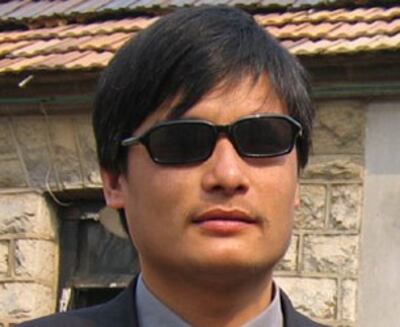More than a month has passed since the 2010 Nobel Peace Prize was awarded in absentia to Liu Xiaobo, but Chinese police maintain tight restrictions on a number of prominent rights activists linked to the jailed dissident, as well as their families.
Liu's elderly father Liu Ling, who is bedridden, was kept under close surveillance during a recent trip to hospital, according to a Hong Kong-based rights group.
"The Shenyang military district sent two officers to keep watch on him at the hospital," the Information Center for Human Rights and Democratic Movement in China said in a statement.
"Their aim was to prevent him from receiving any visitors," it said.
Liu Xiaobo's wife, Liu Xia, has been held under house arrest at the couple's Beijing home since the Nobel committee announced her husband's award on Oct. 8.
Calls to Liu Xia resulted in a permanent busy signal on Tuesday.
Blind activist
Meanwhile, authorities in the eastern province of Shandong continued to hold blind rights activist Chen Guangcheng, his wife and young daughter under house arrest, following Chen's release at the end of a four-year jail term in September.
Chen's case has been publicized among netizens in China who have the technology to circumvent the complex system of blocks, filters and censorship known as the Great Firewall (GFW).
One netizen, He Peirong, known on the microblogging service Twitter as @pearlher, had lost communication with her friends after she drove to Chen's village in Yinan county on Monday, a Beijing-based rights lawyer said.
"No one in this village will speak a word about [Chen]," she told RFA. "I buttonholed some of them and asked if they knew Chen Guangcheng."
"They averted their eyes and walked away without saying a word," said He. "None of the villagers I spoke to, nor the police, was even willing to utter his name."
Social isolation

She said Chen had to deal with extreme social isolation as well as "the rudeness of those who are guarding him."
"It is not good for a person's mental well-being to live for protracted periods of time in such a hostile environment," He said.
Previous visits by netizens have ended in the visitor being turned back by a crowd of around 20 security personnel stationed outside Chen's home.
Beijing-based lawyer Jiang Tianyong said he had remained in close phone contact with He throughout her trip, until losing touch with her late on Monday evening.
"Chen Guangcheng suffered ill-treatment in prison, and now he needs medical attention," Jiang said. "He has never been allowed to have a health check."
"The whole country is concerned about Chen Guangcheng now," he said.
Jiang said He's actions were a measure of this concern.
"I am full of admiration for her courage, for a woman to just go there all alone like that," he said.
"At the same time, I hope that more people would show such concern for Chen Guangcheng's situation."
Pressure
Many, but not all, Chinese activists detained or taken out of town by police have returned home after the Nobel prize ceremony on Dec. 10, during which the peace prize was presented to an empty chair, in the absence of the laureate or any of his close relatives.
Beijing stepped up pressure on political activists when Liu, currently serving an 11-year jail term for subversion, was named the Nobel prize recipient.
The award sparked a nationwide clampdown on anyone having a connection with Liu, or the Charter 08 political blueprint, which he co-authored.
The group wants the authorities to overturn the current official verdict on the 1989 Tiananmen unrest and allow a public reckoning with the bloody crackdown.
Ding Zilin, a retired university professor whose teenage son was killed in the 1989 military crackdown on the student-led pro-democracy movement in Beijing was allowed to return home in late December after being held under 74-day house arrest in another city.
Many dissidents said the authorities had lost all sense of proportion in the wake of Liu's Nobel prize, which Beijing slammed as disrespectful to its legal system.
Boycott
Chinese officials refused to attend the prestigious ceremony in Oslo, Norway, and put strong pressure on diplomats from other countries to boycott the event.
A New York-based rights group said on Tuesday that Beijing had failed to live up to an overwhelming majority of its own human rights goals.
The Chinese government used the 2009-2010 National Human Rights Action Plan (NHRAP), aimed at protecting civil and political rights in China, as “a vehicle” for blunting international criticism of China’s human rights record, according to the New York-based Human Rights Watch.
In the report, entitled “Promises Unfulfilled,” the rights group said that by clamping down on civil and political rights, the Chinese government was actually responsible for enabling a number of abuses originally targeted by the plan.
The group cited the imprisonment of Liu, the enforced disappearance of civil rights lawyer Gao Zhisheng, and the arbitrary detention of Chen Guangcheng.
Reported by Xin Yu and Sun Jian for RFA's Mandarin service, and by Grace Kei Lai-see for the Cantonese service. Translated and written in English by Luisetta Mudie.
